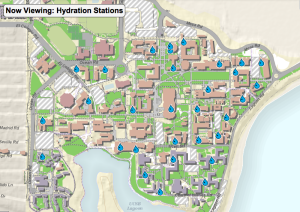By: Andrew Eddie and Carina Bilodeau
In an effort to treat the problem of excessive plastic waste, the Environmental Affairs Board, The Green Initiative Fund, and the Coastal Fund provided grants back in 2012 towards the installation of 22 hydration stations around campus. These stations, which have now increased to more than 30 locations and continuously managed by UCSB Sustainability, are ubiquitous with UCSB’s goal to become waste free by 2020. By installing the water fountains, campus officials hope that students will be able to reduce their plastic usage by filling up their reusable bottles with free, filtered water. In addition to plastic reduction, UCSB estimates that the hydration stations individually save 3,000 kWh of energy that would have gone into the production of single-use plastic bottles. These bottles, a product of coal and oil, also require 5 times the amount of water that goes inside them. This tremendous waste of resources has been completely diverted through the installation of the hydration stations.

UCSB Map Highlighting the Locations of the Hydration Stations
(UCSB Geography Department)
Refilling reusable water bottles instead of continuously buying single use plastic bottles will decrease the amount of plastic pollution in our environment, a belief that fueled the advent of an on campus environmental group, Plastic Solutions. This organization aims to reduce the buildup of plastic waste, much of which ends up in our beloved backyard, the Pacific Ocean. Carina Bilodeau, the co-director of Plastic Solutions and a sophomore environmental studies department, hopes that if students use the hydration stations more in the future, “one day UCSB will not need to sell single use plastic water bottles”.
At the start of this ambitious project back in May 2012, PowerSave noted that the hydration stations “have been wildly successful” at getting students to ditch plastic bottles. While this is a cause for celebration, more can be done. Our student body, and the community we all stand behind, can collectively work together to stop our dependence on plastic and protect our beautiful planet.